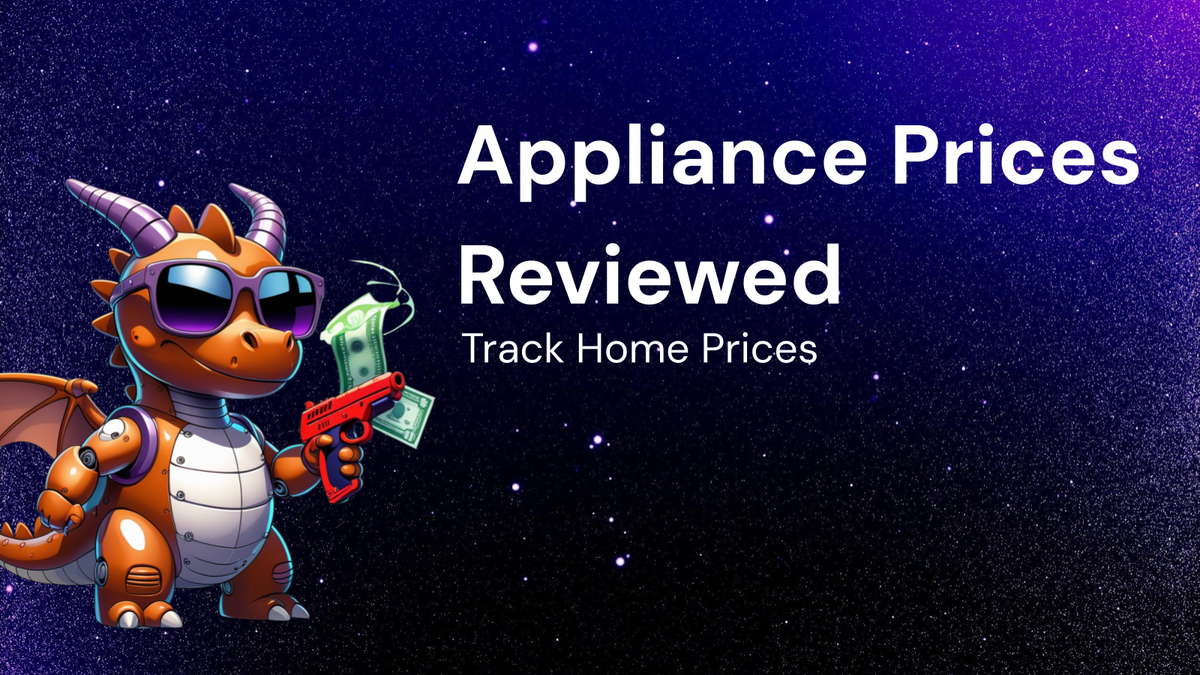Alternative Methods to Track Home Appliance Prices Reviewed

Beyond the Big Box: Unconventional Ways to Snag the Best Deals on Home Appliances
Buying new home appliances is rarely a fun experience. It's often triggered by a breakdown, a necessary upgrade, or a home renovation, all of which usually coincide with a desire to save money. While price comparison websites and big box store ads have been the standard for decades, the landscape of online commerce and consumer behavior has evolved, opening up a world of alternative methods for tracking appliance prices and securing the best possible deals.
This blog post dives into these unconventional techniques, exploring a range of strategies that go beyond the typical approach. We'll delve into the power of community, the nuances of specific retail platforms, the effectiveness of automated tools, and even the potential of leveraging timing and negotiation to your advantage. Get ready to ditch the reliance on traditional methods and discover how to become a savvy appliance price tracker.
I. Leveraging the Power of Community: Forums, Social Media, and Deal Aggregators
The wisdom of the crowd can be a powerful asset when hunting for appliance deals. Online communities dedicated to deal-hunting and consumer advice provide a valuable platform for sharing information, uncovering hidden discounts, and learning from the experiences of others.
- Forums and Online Communities: Websites like Slickdeals, FatWallet (now defunct, but archives and similar sites exist), and Reddit's r/Deals are treasure troves of information. Users actively post deals they've found, often including screenshots, coupon codes, and details on stacking discounts. More specifically, subreddits dedicated to specific brands or types of appliances might exist, allowing for more targeted information gathering.
- How to Use Them Effectively: Actively participate in the community by asking questions, sharing your own findings, and offering insights on the deals you've explored. Read the comments carefully to gauge the validity of a deal and understand any potential limitations or caveats. Be aware that deals can expire quickly, so act fast when you find something promising.
- Example: A user might post a deal on a specific model of refrigerator found at a local appliance store, along with a coupon code that can be applied online. Other users can then comment on their experiences with the retailer, the quality of the appliance, or alternative deals they've found.
- Social Media Groups and Hashtags: Platforms like Facebook, Twitter, and Instagram can also be valuable sources of information. Many retailers post promotional offers and discounts on their social media pages. Searching for relevant hashtags like #appliancedeals, #homedepotdeals, or #lowesdeals can uncover ongoing promotions and limited-time offers.
- How to Use Them Effectively: Follow your favorite appliance brands and retailers on social media. Set up notifications for their posts to stay informed about new deals. Join relevant Facebook groups dedicated to deal-hunting or appliance purchases.
- Example: A local appliance store might announce a flash sale on their Facebook page, offering a significant discount on all washing machines for a limited time. Following their page would allow you to be alerted to this deal immediately.
- Deal Aggregator Websites and Browser Extensions: Websites like RetailMeNot, Honey, and Rakuten (formerly Ebates) aggregate coupon codes and cashback offers from various retailers. Browser extensions like Honey automatically search for and apply available coupon codes when you're shopping online.
- How to Use Them Effectively: Install a deal aggregator browser extension to automatically scan for coupons and cashback offers while you browse online retailers. Check these websites regularly for promotional codes and exclusive deals before making a purchase.
- Example: You're browsing a refrigerator on the Lowe's website. The Honey browser extension automatically detects available coupon codes and cashback offers, allowing you to instantly save money on your purchase.
II. Mastering the Art of Platform-Specific Strategies: Amazon, eBay, and Beyond
Each online retail platform has its own unique algorithms, pricing strategies, and promotional opportunities. Understanding these nuances can give you a significant edge in finding the best appliance deals.
- Amazon's Dynamic Pricing and Lightning Deals: Amazon employs dynamic pricing, meaning the price of an item can fluctuate based on factors like demand, competitor pricing, and time of day. Lightning Deals offer significant discounts for a limited time, often selling out quickly.
- How to Use Them Effectively: Track appliance prices on Amazon using tools like CamelCamelCamel or Keepa to identify price drops and historical pricing trends. Monitor the Amazon Lightning Deals page regularly for potential appliance discounts. Set up price alerts to be notified when an appliance reaches your desired price point.
- Example: You want to buy a new microwave. Using CamelCamelCamel, you can see the historical price fluctuations of a specific model on Amazon and set up an alert to be notified when the price drops below a certain threshold.
- eBay's Auctions and Refurbished Options: eBay offers both new and used appliances through auctions and fixed-price listings. Refurbished appliances, often sold directly by manufacturers or authorized retailers, can offer significant savings.
- How to Use Them Effectively: Research the seller's reputation and read reviews before bidding on an appliance on eBay. Consider purchasing a refurbished appliance from a reputable seller with a warranty. Use eBay's advanced search filters to narrow down your search and find the best deals.
- Example: You find a refurbished washing machine on eBay sold directly by the manufacturer. The listing includes detailed information about the refurbishment process and a warranty, making it a more attractive option than buying a new machine at full price.
- Outlet Stores and Overstock Websites: Websites like Overstock.com and outlet stores operated by major retailers often sell discounted appliances that are discontinued, open-box, or have minor cosmetic imperfections.
- How to Use Them Effectively: Check these websites regularly for clearance sales and overstock deals on appliances. Carefully inspect the product description and photos to assess the condition of the appliance. Be aware of the return policy and warranty options before making a purchase.
- Example: You find a slightly damaged refrigerator at a Sears Outlet store. The damage is purely cosmetic and doesn't affect the appliance's functionality. You negotiate a further discount with the store manager, resulting in a significant savings compared to buying a new refrigerator.
III. Automating the Price Tracking Process: Tools and Apps for the Modern Shopper
Manually tracking appliance prices can be time-consuming and tedious. Fortunately, a variety of automated tools and apps can streamline the process and help you identify the best deals with minimal effort.
- Price Tracking Websites and Browser Extensions (Revisited): As mentioned earlier, CamelCamelCamel, Keepa, and Honey are invaluable tools for tracking prices on Amazon and other online retailers. These tools allow you to set price alerts, view historical pricing data, and automatically apply coupon codes.
- Deeper Dive: Explore the advanced features of these tools, such as price watchlists, email notifications, and price history charts. Experiment with different settings to customize the price tracking process to your specific needs.
- Dedicated Price Tracking Apps: Several mobile apps are specifically designed for tracking prices and finding deals on a wide range of products, including appliances. Examples include ShopSavvy, PriceJump, and BuyVia.
- How to Use Them Effectively: Download a price tracking app and create a list of the appliances you're interested in buying. Set price alerts for each appliance and receive notifications when the price drops below your desired threshold. Scan barcodes in-store to compare prices with online retailers.
- IFTTT (If This Then That) Automation: IFTTT is a web-based service that allows you to create automated tasks based on specific triggers and actions. You can use IFTTT to create applets that automatically track appliance prices on specific websites and send you notifications when a deal is found.
- How to Use Them Effectively: Create IFTTT applets that monitor RSS feeds of deal websites or track specific keywords on Twitter. Receive email or SMS notifications when a new deal is posted that matches your criteria. This requires some technical know-how but can be highly effective.
- Example: Create an IFTTT applet that monitors the RSS feed of Slickdeals for posts containing the keywords "refrigerator" and "sale." Receive an email notification whenever a new deal matching these criteria is posted.
IV. The Art of Timing and Negotiation: Playing the Long Game for Maximum Savings
While technology can automate the price tracking process, human intuition and strategic timing can also play a crucial role in securing the best appliance deals.
- Shopping During Off-Peak Seasons and Holidays: Retailers often offer significant discounts on appliances during off-peak seasons, such as late summer or early fall, when demand is lower. Major holidays like Black Friday, Cyber Monday, and Memorial Day are also prime opportunities for finding appliance deals.
- Strategic Approach: Plan your appliance purchases in advance and wait for these off-peak seasons or holidays. Monitor prices in the weeks leading up to these events to identify potential deals. Be prepared to act quickly when a good deal is offered.
- Negotiating with Sales Representatives: Don't be afraid to negotiate with sales representatives, especially at local appliance stores. You may be able to haggle for a lower price, especially if you're buying multiple appliances or paying in cash.
- Tips for Negotiation: Research the prices of the appliances you're interested in buying at other retailers. Be polite and respectful but firm in your negotiation. Be willing to walk away if the salesperson isn't willing to meet your price.
- Example: You're buying a new refrigerator and dishwasher from a local appliance store. You negotiate a lower price by pointing out a lower price you found online for the same models and by offering to pay in cash.
- Considering Open-Box, Refurbished, or Discontinued Models: As mentioned earlier, open-box, refurbished, or discontinued appliances can offer significant savings. These models may have minor cosmetic imperfections or be slightly older, but they often function perfectly well.
- Due Diligence is Key: Carefully inspect the appliance for any damage or defects. Ask about the warranty and return policy before making a purchase. Research the model to ensure it meets your needs and expectations.
V. Beyond Price: Evaluating the Total Cost of Ownership
While price is an important factor, it's crucial to consider the total cost of ownership when buying new appliances. This includes factors like energy efficiency, repair costs, and lifespan.
- Energy Efficiency and Long-Term Savings: Look for appliances with high Energy Star ratings to minimize your energy consumption and reduce your utility bills over the long term.
- Utilize Energy Star Resources: Visit the Energy Star website to compare the energy efficiency of different appliance models. Use the Energy Star calculator to estimate your potential savings.
- Repair Costs and Warranty Coverage: Research the reliability of different appliance brands and models to avoid costly repairs down the road. Consider purchasing an extended warranty to protect yourself against unexpected repair expenses.
- Read Reviews and Check Ratings: Consult consumer reviews and product ratings to assess the reliability of different appliances. Compare the warranty coverage offered by different manufacturers.
- Lifespan and Replacement Costs: Consider the expected lifespan of the appliance and the cost of replacing it when it eventually breaks down. Choose appliances that are durable and built to last.
- Factor in Depreciation: Remember that appliances depreciate over time. Factor in the cost of replacing the appliance when budgeting for your long-term expenses.
Conclusion:
Finding the best deals on home appliances requires a strategic and multifaceted approach. By leveraging the power of online communities, mastering platform-specific strategies, automating the price tracking process, and employing smart timing and negotiation tactics, you can significantly increase your chances of securing the best possible price. Remember to consider the total cost of ownership, including energy efficiency, repair costs, and lifespan, to make an informed decision that will save you money in the long run. Don't be afraid to deviate from traditional methods – the world of online commerce is constantly evolving, and embracing these alternative strategies will empower you to become a savvy and informed appliance shopper.




